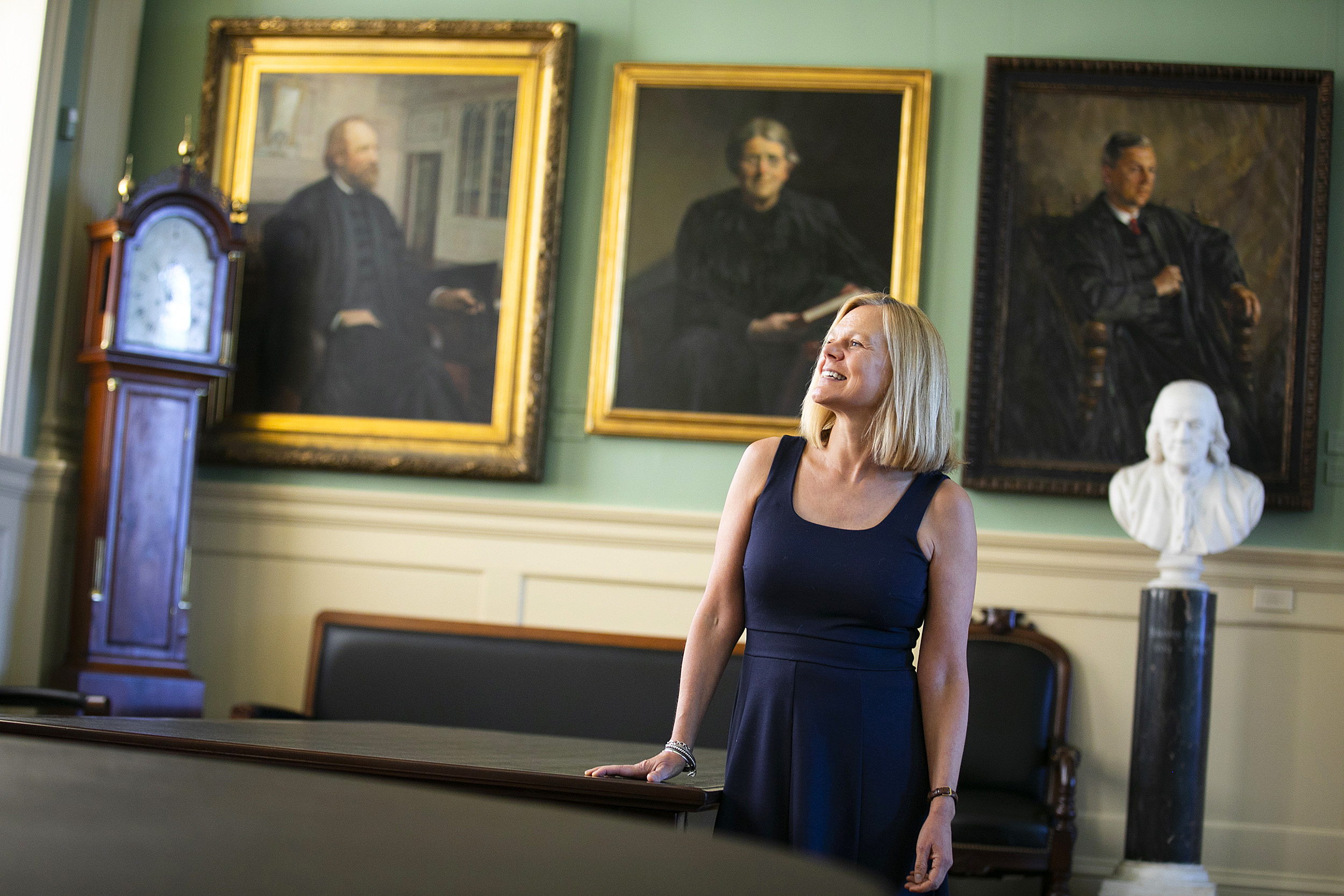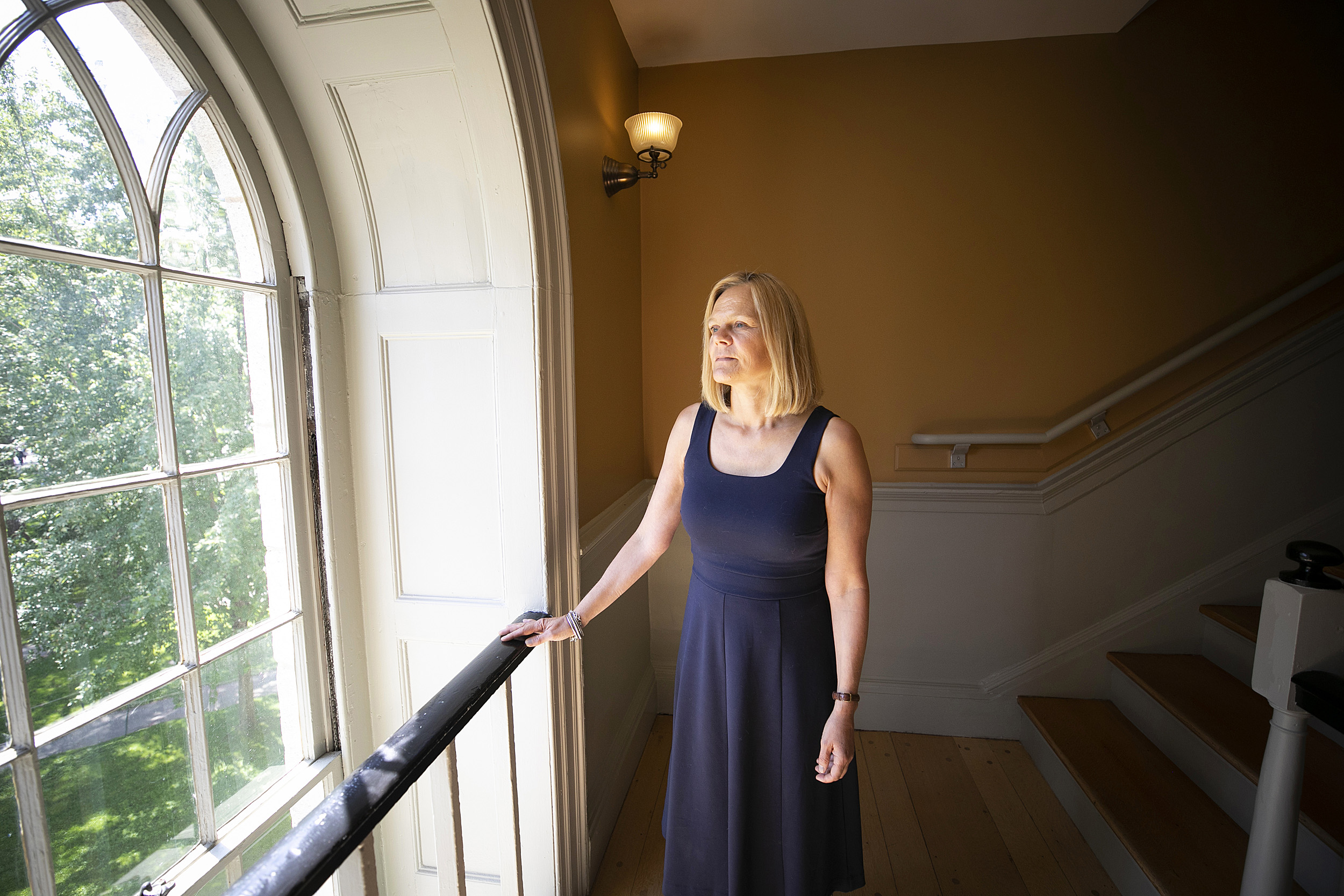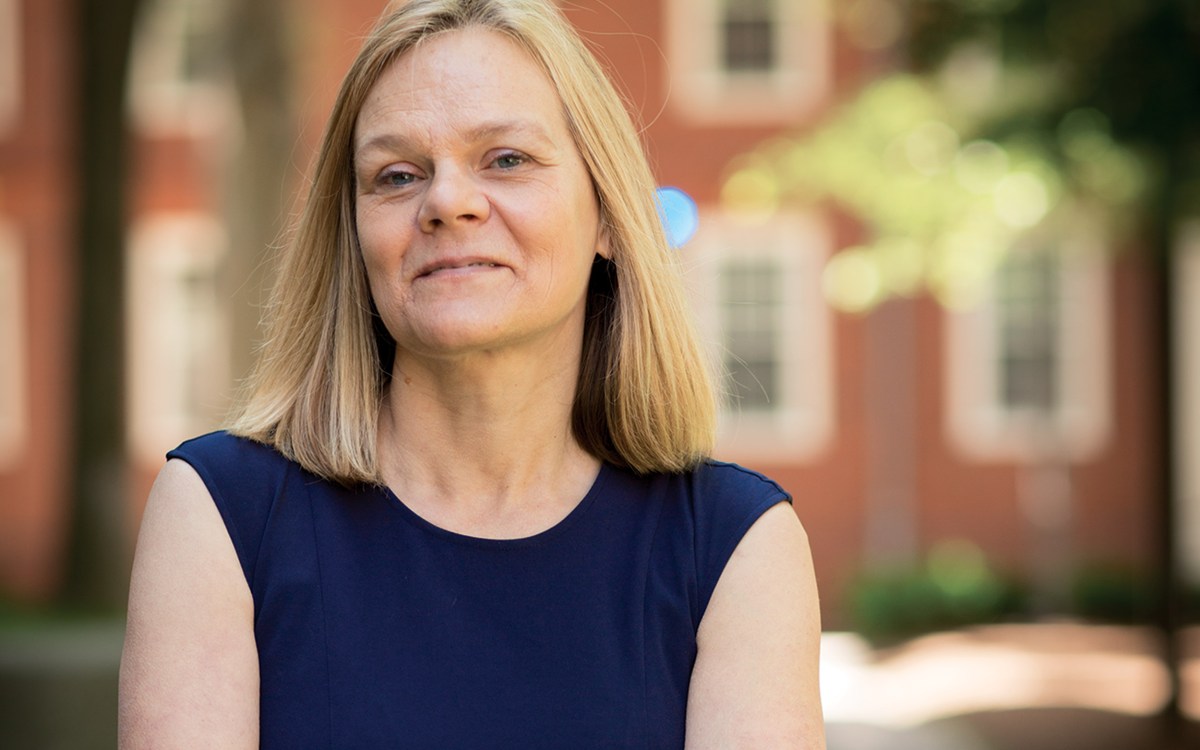
Photos by Stephanie Mitchell/Harvard Staff Photographer
Emma Dench on helping graduate students succeed
GSAS dean discusses her first year leading ‘the beating intellectual heart of the University’
In her first year as dean of Harvard’s Graduate School of Arts and Sciences (GSAS), Emma Dench focused on trying to give all 4,400 of her charges a deeper sense of connection to the School; managing the transition of Dudley House to the newly formed GSAS Student Center; and communicating with alumni here and abroad. She has also been rethinking ways to promote effective advising, something she sees as “central to the successful completion of a graduate student’s education.” Dench said she enjoys spending time with students and so keeps regular office hours and hosts a British-themed tea each semester. The McLean Professor of Ancient and Modern History and of the Classics continues to engage in her own scholarship and views that as key in helping her relate to everything GSAS students go through. The Gazette recently spoke with Dench about her vision for what she considers “the beating intellectual heart of the University.”
Q&A
Emma Dench
GAZETTE: What has your first year has been like? Biggest surprises, challenges?
DENCH: This past year I have been getting ready to launch initiatives and grappling with what I consider the biggest challenge, which is the enormity of GSAS. It’s a School, but it’s also a platform. We really are One Harvard, as we oversee 59 master’s and Ph.D. programs based in the Faculty of Arts and Sciences (FAS) and at nearly every School at the University. We’ve got more than 4,400 students, many of whom are Ph.D. students imbedded in and working with faculty at the Harvard Graduate School of Education or Harvard Kennedy School or across the river in the Longwood campus at Harvard Medical School or the Harvard T.H. Chan School of Public Health. While we bring Ph.D. students together, we also deal with the extreme atomization that comes from being located in the different Schools. Our challenge is in reaching out to students to let them know we are there for them and to reinforce the idea that they are both connected to whatever School they reside in and are part of the broader GSAS identity.
GAZETTE: Are there particular areas or themes you have been focusing on?
DENCH: I have focused on three areas this past year. First, I have been addressing that atomization, helping students establish a connection with GSAS, and also with me, by developing programs that make me more accessible. The students all know, in theory at least, to call me Emma, and I started holding office hours, which have been very popular. Students are encouraged to come with a question, an issue, or just to say hello. Some bring a complicated issue, a paper, or even a PowerPoint, and that’s absolutely fine. The most frequent comments I hear are “I’ve never been in this building before” and “I’ve never spoken to a dean.” Meeting with and getting to know our students has been absolutely delightful.
We also host a tea once a term, like the office hours, which have no agenda. They are British-themed and beautifully hosted by the GSAS Student Center in Lehman Hall. The conversations I have had with students have been amazing. These are very relaxed occasions, and a really nice opportunity to catch up and make connections. Sometimes we sit on the floor, or take selfies. It’s been really, really fun.
I’ve also focused on managing the transition from Dudley House to the GSAS Student Center. We used to share Dudley House with the College, but last year Dudley split to form the Dudley Community for undergraduates and the GSAS Student Center for GSAS students. This has been a wonderful opportunity to take a fresh look at the specific needs of graduate students, this atomized body that really is crying out for a center. We are in the process of appointing an executive director and thinking afresh about the programming and building use. We’ve had impactful conversations with the student leaders who have been involved in the process and the interviews for the executive director.
Finally, we’ve done an incredible amount of alumni outreach. I visited 12 cities this academic year, mostly in North America, but I also traveled to Athens, Rome, London, and Zurich. I wanted to hear from our alumni about their experiences as GSAS students and share what we are accomplishing at GSAS. We also discussed how we could engage them and connect them with current students. For example, we held a Flash Mentoring Week in collaboration with the Office of Career Services, where alumni who wanted to mentor current students could link up. The idea of expanding that is very exciting.
During her first full year as the dean of Harvard’s Graduate School of Arts and Sciences, Emma Dench has been focused on connecting students from around the University to GSAS, and helping them connect with her.

GAZETTE: You have mentioned that rethinking the role of advising for graduate students has been another priority for you. Why is that so important and where are you in that process?
DENCH: Good advising is central to the successful completion of a student’s graduate education and often leads to meaningful lifelong professional and personal connections. At GSAS, we’re asking what best practices lead to the most effective advising relationships. We want to celebrate those positive interactions. Advising has formed part of the broad conversations I have been having with alumni, who have reflected on how advising influenced them as Harvard students. What I am often hearing is that good advising is a group effort that regularly involves a dissertation director, dissertation committee members, other members of the faculty, and program administrators, preferably in complementary roles.
We are also addressing the harder question of what gets in the way of effective advising and identifying those factors. We are exploring how to intervene and what behaviors we can model institutionally through example, through encouragement, and through training. Above all, we believe a culture change is required so that advising is uniformly taken seriously — and I think we are on the brink of that change. We envision what we are calling The Advising Project as a two-year initiative. But this is more than a two-year project: We intend to create momentum and engagement to ensure we continue to support and promote effective advising.
It takes a village. I don’t think that’s a secret. It’s much healthier to have multiple advisers, and, of course, any project benefits from multiple perspectives. Going forward we need to ensure that GSAS students have easy access to a range of people who can help them succeed.
GAZETTE: What has the transition been like from faculty member to dean?
DENCH: Honestly, I’ve experienced many continuities, which is as it should be. In terms of my status as an academic, I am delighted and terribly proud that my third book, “Empire and Political Cultures in the Roman World,” came out last summer. The FAS named me a Walter Channing Cabot Fellow for it, and I gave a number of named lectureships last year as well, so I do still feel like an academic even though it’s not easy. I do believe that GSAS is the beating intellectual heart of the University, and as such, I feel a responsibility to stay connected so that I can relate to writer’s block, imposter phenomenon, and everything else our students go through.
In a more administrative sense, my work as the director of graduate studies in the Department of the Classics for many years gave me a useful tool kit. I draw on that experience, on the conversations I had over the years, on all the little interventions we implemented. I’ve spent hundreds of hours talking to students at every point in their careers. I think because classics students are very adaptive and they have had to think about a variety of careers, we were way ahead of the curve. Drawing on that knowledge and experience has helped me better understand, from the students’ point of view, the scope and size of GSAS and the vast diversity of experiences students have in different programs, as well as their different backgrounds.
My own interests have also played a part, particularly around institutional structure and how individuals and groups work within it. It’s not an accident that my most recent publication explored how the Roman Empire worked. So I’ve found the position very challenging but incredibly interesting in learning how the University works from the vantage point of GSAS. Every day I learn something new and recalibrate what I thought I knew.
“I do believe that GSAS is the beating intellectual heart of the University, and as such, I feel a responsibility to stay connected so that I can relate to writer’s block, imposter phenomenon, and everything else our students go through.”
GAZETTE: Is there anyone you turn to for advice?
DENCH: As a faculty member, I had absolutely no idea what deans do — I still can’t believe how little I knew. I’m fortunate to have the most amazing colleagues within GSAS, and we have a very open and direct line of communication. We share what is on our minds and it’s incredible. The directors of graduate studies, program heads, and program administrators are an amazing group, and teach me so much every day. Other deans at Harvard have also been a great resource for me. You really need to have people to talk to who completely understand and with whom you can be candid. I’m glad to experience that with my Harvard colleagues.
GAZETTE: What is the best part about the job?
DENCH: The colleagues and the students. What’s not to love about GSAS students? They are so brilliant. They are doing cutting-edge work and trying to balance their lives. I totally relate to that; that’s been the story of my life, my own struggle since I was a teenager. And I am so proud of them. You see them graduating and, in some cases, you have an inkling of everything they went through and everything they overcame. I am on the brink of crying much of the day on Commencement.
GAZETTE: Have you taken a break from teaching?
DENCH: I took a short break from teaching in the classroom but I have been advising, engaging in one-to-one predissertation work, and taking part in Ph.D. committees. I co-advised two senior theses last year, and I will be doing that again this year, so that really has kept me connected to the students. I am also co-teaching a graduate seminar on Macedonia next spring with my wonderful colleague Paul Kosmin.
GAZETTE: In your life away from Harvard, were you able to travel this summer for vacation?
DENCH: Both this year and last year immediately after Commencement, my husband, Jonathan, and I have gone on hiking holidays to Italy. This year we went to the island of Elba just off Tuscany. It’s rugged terrain, an iron-ore mining outpost since before the Etruscans. It’s also known for sheep and goat raising. More famously, it’s one of the places Napoleon was exiled. For us it has a particular kind of resonance because we met in Rome in 1992, and the next summer Jonathan had an artist’s residency in the remote interior of the island, and I visited him for a week. So, this recent trip was a nice return to a happy summer when we were much younger.
GAZETTE: For the Gazette’s recent summer reading story, you said you had been reading Mark Mazower’s “Salonica, City of Ghosts: Christians, Muslims and Jews, 1430‒1950,” and Margaret Atwood’s “Bodily Harm.” Is there anything new on your nightstand?
DENCH: I am reading Alice Munro’s novel “Lives of Girls and Women,” and loving it.






